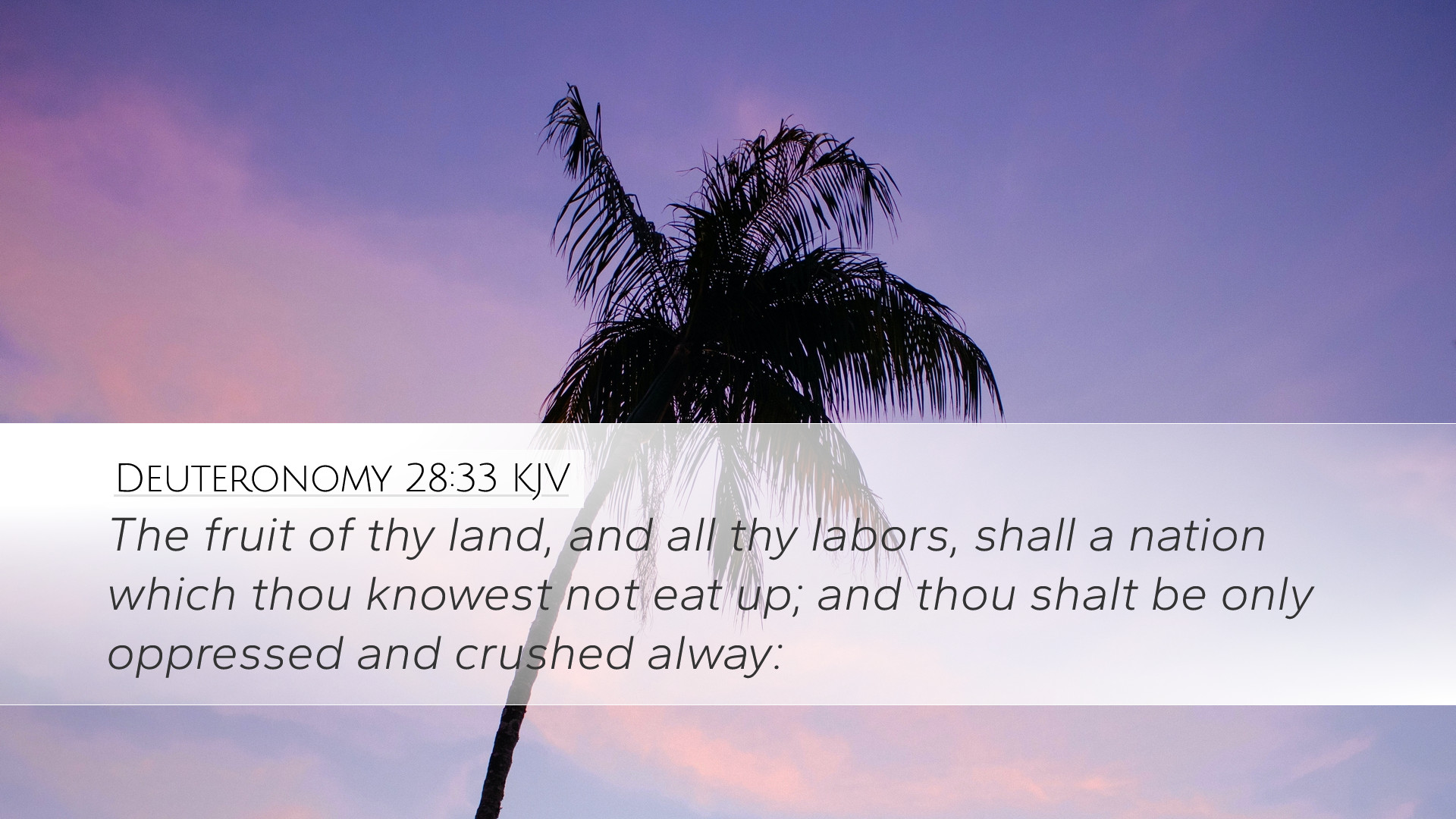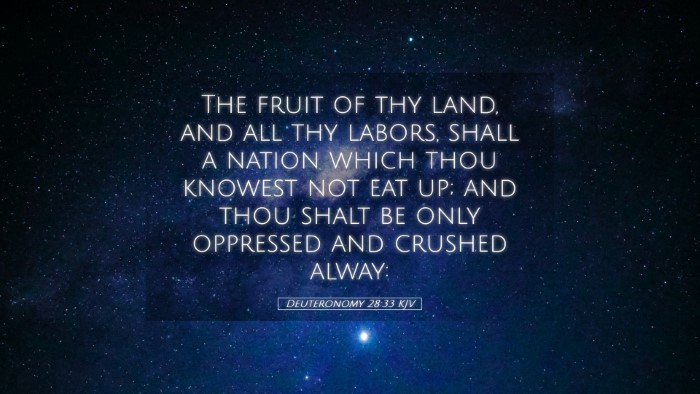Deuteronomy 28:33 Commentary
Verse Text: "The fruit of thy land, and all thy labours, shall a nation which thou knowest not eat up; and thou shalt be only oppressed and crushed alway."
Introduction
The verse from Deuteronomy 28:33 is nestled within the larger context of blessings and curses presented by Moses to the Israelites. This particular verse is a somber reminder of the consequences of disobedience to God’s commands. Drawing on insights from various public domain commentaries, we can delve into its theological implications, historical context, and practical applications.
Historical Context
This chapter is a part of the covenant law given to the people of Israel before they enter the Promised Land. Moses outlines the blessings that result from obedience and the curses that stem from disobedience. The specific mention of a "nation which thou knowest not" highlights the foreign conquests and dominations that would occur as a result of Israel's failure to uphold their covenant obligations.
Commentary Insights
Matthew Henry's Commentary
Matthew Henry stresses the moral and spiritual decay that results from neglecting God’s commandments. He interprets this verse as emblematic of a deep-seated oppression the people would face. The “fruit of thy land” serves as a metaphor for the hard work and forth-putting effort that will ultimately benefit those outside the covenant community, illustrating the loss of sovereignty over one's own blessings.
Albert Barnes' Notes
Albert Barnes articulates the specific threat of foreign invasion and oppression. He notes that this situation represents a reversal of fortunes—a sign that God’s favor is withdrawn. The mention of a nation that they do not know signifies a complete takeover, where the Israelites would suffer at the hands of those without respect for their heritage or relationship with God. Barnes emphasizes that the land, which was to be a source of abundance and blessing, will instead become a source of lament and grief.
Adam Clarke's Commentary
Adam Clarke’s insights direct the reader to understand the emotional and physical consequences of such alienation from God’s support. He explains that the act of “eating up” the fruits signifies dispossession not just materially but spiritually and psychologically. Clarke sees this as a profound warning against complacency and the peril of letting external influences undermine their covenantal relationship with God. He conveys that this prophecy speaks to the need for vigilance in faithfulness, as the land is a gift from God that should not be taken for granted.
Theological Implications
This verse starkly illustrates a theological principle in the Old Testament about the correlation between faithfulness to God and the prosperity of the people. The concept of divine retribution underscores that the blessings of the promised land are contingent upon the people's obedience. Conversely, the curses are manifestations of divine justice reflecting God’s holiness and the seriousness of covenantal obligations. The warning of oppression depicts a God who is actively involved in the lives of His people, responding to their collective behavior.
Practical Applications
- Reflection on God's Blessings: This verse prompts individuals and communities to reflect on their own lives and the blessings they enjoy. Are these blessings being acknowledged and used appropriately in service to God and others, or is there a risk of losing them through neglect?
- Call to Faithfulness: The verse serves as a reminder of the importance of maintaining a faithful walk with God. Leaders and congregations should evaluate their commitment to God’s principles.
- Understanding Consequences: It highlights the serious ramifications of disobedience. Consideration should be given to how personal and corporate actions can lead to spiritual or social consequences.
- Vigilance Against Cultural Influences: The reference to a nation that they do not know raises concerns about the impact of external cultural influences that can erode spiritual commitment. It calls for a discerning approach to incorporate godly principles in everyday life.
Conclusion
Deuteronomy 28:33 serves as a potent reminder of the consequences of disobedience against God and the loss of autonomy and blessing that can ensue. The insights of Matthew Henry, Albert Barnes, and Adam Clarke provide a comprehensive understanding of the weight of this verse, urging believers today to remain steadfast in their commitment to God’s covenant. As we reflect on its meaning, let the lessons resonate within our hearts, prompting practical faith in action and a commitment to honoring God above all else.


